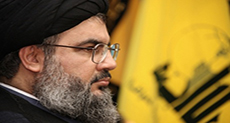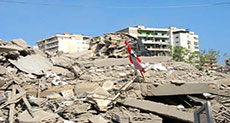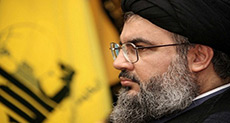The Army and the Resistance, pillars of the defensive strategy
Source: Monday Morning, 14-6-2006
The question of the hour is: What is meant by a "defensive strategy"? Sayyed Hassan Nasrallah, secretary-general of Hizbullah, laid out his conception of it at the dialogue session of May 16, stressing the peril posed to Lebanon by "Israel", which requires our country to be on the alert and not to disarm in the face of a country possessing a powerful military. In his presentation Nasrallah recalled the history of the Resistance and its role, which has consisted in a close coordination with the Army, a coordination that made possible the liberation of South Lebanon. But the strategy he proposes is a matter of controversy on the national level.
Yassin Soueid: ‘The Army and the Resistance, pillars of the defensive strategy'.
Retired Brigadier Yassin Soueid begins with a historical overview of military strategy, as conceived by American, French, British and Russian strategists before defining it according to the modern conception.
"It consists", he says, "in mobilization by the state of all its resources in order to defend the homeland following adoption of a "total strategy" or "high strategy. This must be linked to strategies related to the various state sectors on the economic, industrial, educational, media and military levels".
Do the Lebanese authorities envisage drawing up a defensive strategy?
As far as I know, my reply can be only negative. But such a strategy is necessary since our country has a shared frontier with "Israel", whose expansionist aims and intentions regarding us are not reassuring.
Emerging weakened from the 1975-90 war, Lebanon has not had the possibility of setting on foot a strong military force capable of foiling the plans of the "Israeli" enemy. That's why support forces are needed, and the Resistance is just the kind of supplementary force needed.
What does the "defensive strategy" consist in?
I haven't yet been informed of the details of the strategy whose broad lines have been laid down by Sayyed Nasrallah at a recent news conference. I consider that such a strategy is necessary, and Hizbullah has done well to explain its basis to the dialoguers at the round table.
The two pillars of the strategy
In my view, this strategy rests on two fundamental pillars: the regular military forces and the popular Resistance. It's not reasonable that our Army should not possess the manpower and equipment enabling it to carry out its mission. As we wait for it to be reequipped, it is necessary to maintain the Resistance as a supplementary force.
Lebanon needs three essential elements: First, a strong state capable of fulfilling its responsibilities toward its people; second, a striking force capable of defending the homeland against all the dangers threatening it; and third, a Resistance capable of serving it as a back-up force.
How can a country with limited resources and burdened with debt set up a strong army? Will the big powers, notably the United States, allow it to possess an arsenal equivalent to that of "Israel"?
I doubt it. The Resistance will remain a necessity to ensure the defense of homeland and its frontiers. But what troubles certain groups of our people is the sectarian character of the Resistance. This point should be the subject of a frank and transparent debate at the dialogue table. In my opinion, the solution may lie in opening the Resistance to all our people, especially to young people who have faith in their country and who are determined to ensure its continuance, regardless of the community they belong to.
Building a strong homeland
Unfortunately, the confessional system prevailing in Lebanon since 1920 has prevented the unification of the Lebanese people. I'm sorry to say that we still live in a society in which people's first loyalty is to their community; we have not reached the level of a true nation. The "Israeli" enemy, with its military power, has targeted our water and our land. We must therefore renounce our confessionalism so that we can build a strong, coherent and solidary nation. We will then be able to say that the state, the Army and the Resistance constitute Lebanon's impregnable rampart. Without this, our country cannot be reassured about its future if it does not adopt the defensive strategy.
The question of the hour is: What is meant by a "defensive strategy"? Sayyed Hassan Nasrallah, secretary-general of Hizbullah, laid out his conception of it at the dialogue session of May 16, stressing the peril posed to Lebanon by "Israel", which requires our country to be on the alert and not to disarm in the face of a country possessing a powerful military. In his presentation Nasrallah recalled the history of the Resistance and its role, which has consisted in a close coordination with the Army, a coordination that made possible the liberation of South Lebanon. But the strategy he proposes is a matter of controversy on the national level.
Yassin Soueid: ‘The Army and the Resistance, pillars of the defensive strategy'.
Retired Brigadier Yassin Soueid begins with a historical overview of military strategy, as conceived by American, French, British and Russian strategists before defining it according to the modern conception.
"It consists", he says, "in mobilization by the state of all its resources in order to defend the homeland following adoption of a "total strategy" or "high strategy. This must be linked to strategies related to the various state sectors on the economic, industrial, educational, media and military levels".
Do the Lebanese authorities envisage drawing up a defensive strategy?
As far as I know, my reply can be only negative. But such a strategy is necessary since our country has a shared frontier with "Israel", whose expansionist aims and intentions regarding us are not reassuring.
Emerging weakened from the 1975-90 war, Lebanon has not had the possibility of setting on foot a strong military force capable of foiling the plans of the "Israeli" enemy. That's why support forces are needed, and the Resistance is just the kind of supplementary force needed.
What does the "defensive strategy" consist in?
I haven't yet been informed of the details of the strategy whose broad lines have been laid down by Sayyed Nasrallah at a recent news conference. I consider that such a strategy is necessary, and Hizbullah has done well to explain its basis to the dialoguers at the round table.
The two pillars of the strategy
In my view, this strategy rests on two fundamental pillars: the regular military forces and the popular Resistance. It's not reasonable that our Army should not possess the manpower and equipment enabling it to carry out its mission. As we wait for it to be reequipped, it is necessary to maintain the Resistance as a supplementary force.
Lebanon needs three essential elements: First, a strong state capable of fulfilling its responsibilities toward its people; second, a striking force capable of defending the homeland against all the dangers threatening it; and third, a Resistance capable of serving it as a back-up force.
How can a country with limited resources and burdened with debt set up a strong army? Will the big powers, notably the United States, allow it to possess an arsenal equivalent to that of "Israel"?
I doubt it. The Resistance will remain a necessity to ensure the defense of homeland and its frontiers. But what troubles certain groups of our people is the sectarian character of the Resistance. This point should be the subject of a frank and transparent debate at the dialogue table. In my opinion, the solution may lie in opening the Resistance to all our people, especially to young people who have faith in their country and who are determined to ensure its continuance, regardless of the community they belong to.
Building a strong homeland
Unfortunately, the confessional system prevailing in Lebanon since 1920 has prevented the unification of the Lebanese people. I'm sorry to say that we still live in a society in which people's first loyalty is to their community; we have not reached the level of a true nation. The "Israeli" enemy, with its military power, has targeted our water and our land. We must therefore renounce our confessionalism so that we can build a strong, coherent and solidary nation. We will then be able to say that the state, the Army and the Resistance constitute Lebanon's impregnable rampart. Without this, our country cannot be reassured about its future if it does not adopt the defensive strategy.




